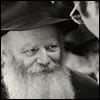The setting is like a picture postcard scene entitled Winter. The snow glitters like jewels in the reflected light of the lamp posts, and the dark winter sky is studded with zillions of bright stars. I put my hand in my pocket and touch the note, my link to reality.
We were supposed to be back home in New York by now, but a heavy snowfall there made it impossible for any planes to land. The note in my pocket is the response of the Rebbe to this situation.
We were told to continue the work of the Seventeenth Annual Lubavitch Women's Convention, which we had just attended here in the Detroit area, until we could get home, and that is why we are now walking across the campus of Michigan University in 10 below zero cold.
We knocked on the door to the sorority house which we had been told had a majority of Jewish members. We explain to the house mother that we want to invite the students personally to an interesting gathering to be held in the near future.
When we receive a negative response, we ask if we can meet some of the students. Again we are graciously refused. The sorority head walks in, hears our request and thanks us while opening the door to make sure we leave. The students are too busy cramming for exams, was her excuse.
"Where do they study?"
In the library, "Ugly," as it is affectionately called on campus.
When we reach the center of the campus, we see all kinds of stores and we get an idea. Perhaps we were refused admission to the sorority house, so we could reach a larger number of students. We begin to paste posters in the most likely gathering places, the laundromat, restaurants, coffee shops, etc. We take turns, for our fingers turn stiff from the bitter cold. I wonder about frost-bite as the chilling cold penetrates, but courageously we march on, soldiers of the Rebbe.
Finally we reach the library area. When we find out that there is a graduate as well as an undergraduate library, we divide into two small groups.
The silence in the library is overwhelming, but the physical warmth is welcome. We feel awkward and totally out of place. Whom do we approach? How? Most of the students look like typical middle-class non-Jewish Americans.
We walk up the stairs and meet two young ladies. In response to our question "Are you Jewish?", they give a visible jump and appear somewhat shaken up. When they respond affirmatively and we hand them a notice about the meeting, we all begin to relax. We speak to them for a few minutes, and when they depart they are both carrying Shabbat candles.
This was the breakthrough; now we feel more confident. We speak to several young men and ladies, and distribute some more candles and posters about the coming evening program in the University Chabad House.
On the third floor we enter the students' lounge of the library. We walk up to the bulletin board and place a notice in a conspicuous place. Suddenly I feel someone close behind me. "What is that all about?" inquires the young man. I tell him about the meeting and suggest that he attend.
"Maybe," he responds, quite hesitantly.
"Who are you?" he asks.
We explain. He appears to warm up, but when Linda hands him some pamphlets, he quickly puts his hands behind his back and moves away. "Don't push me," he says, "I had enough of religion being pushed down my throat."
I ask him about his childhood and he tells of being raised in a Conservative home with afternoon Hebrew School three times a week. Now he is interested in finding out about "life." He wants to open his eyes to all there is and then make his own decisions.
I ask him if in his search he isn't learning more about other cults and philosophies than his own. I ask him why he is so open to everything except that which is rightfully his—Judaism. He is startled.
"That's very bright," he says. "You know, that's the most intelligent thing I have heard in a long time."
I suggest that he learn about Judaism with the same fervency that he is ready to apply to everything "out there." He asks if our meetings are open to the general public, and I explain that we are interested in our own, in helping our youth find their roots.
We depart with a semi-promise that he will attend the forthcoming meeting. We meet the other members, and the Chabad House on Wheels takes us back to our quarters.
For whom did we have to come, I wonder? Will it be someone who will read our notices pasted up all over the campus? Is it the young man, perhaps? Whoever it may be, it was worth it.
From the Rebbe, of righteous memory, I learned that if you are detained for whatever reason, your time should be utilized well.







Join the Discussion